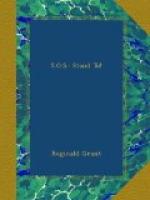The Tommies grabbed them in their arms, hugged them, slapped them on the backs and chests until the wind was fairly knocked out of them, and if we had been Frenchmen instead of Britishers, our mouths would have been covered with black grease from kisses imprinted on their cheeks.
All night long, long lines of men in gray were passing through our sector, in some places as many as 50 of them being escorted by one soldier; German Red Cross men were carrying out our wounded, eagerly volunteering for this work in the thought that they would find favor by so doing.
After taking Pozieres and driving over the ridge and on down into the Courcelette Valley, we took up a position about 500 yards from the German front lines. Here occurred another of those remarkable escapes from the Grim Reaper’s toll that won for me throughout the unit the pseudonym, “Horseshoe Grant.”
Eighteen loads of ammunition were being hauled to the guns and when being unloaded, enemy fire opened up on the position, several horses were hit, the doors of the wagons were flung open and the horses, stricken with fright, galloped madly about, the shells being strewn over the ground all the way to the bridge several hundred yards off,—a bridge that was a vitally important structure to us, because over it every pound of supplies and ammunition had to cross in order to get to us. I have often thought what a disaster it would have meant to us had Fritz ever got to this passageway. The drivers finally managed to close the wagon doors and get most of them back over the bridge, but the shell fire had then become so heavy that “Take cover!” was ordered.
The Hun kept up the bombardment for some time and the O.C. thought it better to let the ammunition lie where it was until daylight, when he intended to have it gathered up. He did not wait for daylight; in the middle of the night we were called out to manhandle the ammunition from an improvised sled that had been built and loaded with it and hauled over the mud to the bridge. There was no slacking on that job, every man carrying two of the shells—18 pounders—and when we finally got them to the guns we were allowed to turn in.
[Illustration: Behemoth in Battle]
Just before daylight a counter attack started and we were ordered to repel it, which we did with all the ammunition that was capable of being used; lots of it we could not use as the mud and dirt prevented; it had to be thoroughly cleaned and oiled before being fired. The battle lasted well until noon, and having accomplished our work we got a “Stand down!” after which came the usual hurry and scurry to clean and oil our pet and get her all in readiness for the next act. There was still some ammunition left lying on the ground that had been spilled, and we were instructed to gather it in at once, clean and oil it and put it in the gun pit. While busy at this job I glanced overhead and noticed an airplane:




